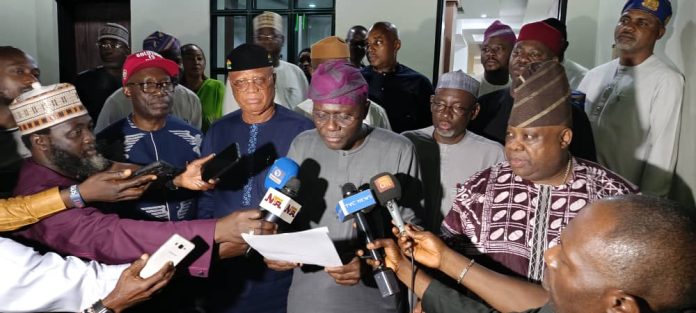…Pledge to streamline goods movement as food inflation worsens; seek resolution with World Bank on NG-CARES funding
In a decisive move to combat rising food inflation and ease the burden on Nigerians, the 36 state governors under the Nigeria Governors’ Forum (NGF) have agreed to work closely with the Federal Government to dismantle unauthorized checkpoints, streamline levies, and address other logistical bottlenecks that are inflating food costs across the country.
The resolution was disclosed in a communiqué read by Lagos State Governor, Babajide Sanwo-Olu, on Thursday morning, following the Forum’s 3rd meeting held on Wednesday, June 18, 2025. The communiqué was signed by NGF Chairman and Governor of Kwara State, AbdulRahman AbdulRazaq.
NSA, Ministers Brief Governors on Root Causes of Food Price Surge
During the meeting, governors received a high-level briefing from the National Security Adviser (NSA), who was accompanied by the Ministers of Defence, Agriculture, Livestock Development, and Transportation. The presentation outlined the proliferation of checkpoints, illegal taxation, and decrepit infrastructure as major drivers of food supply chain inefficiencies and inflation.
> “Governors acknowledged the urgency of the matter and expressed their commitment to collaborate with federal authorities to streamline levies, dismantle unauthorized checkpoints, and improve the movement of goods across states,” the communiqué stated.
The NSA informed the Forum that a high-level inter-ministerial committee had already been set up to address the challenges and had submitted recommendations for the governors’ endorsement.
Inflation Hits Households, Farmers, and Transporters
The development comes amid mounting concerns over food price inflation, which continues to squeeze household incomes. Farmers and transporters have repeatedly lamented the presence of multiple levies and illegal roadblocks by various government agencies—including police, customs, and road safety officials—which increase transportation costs and eventually inflate the prices of food items.
Independent reports confirm that many of these checkpoints are often unauthorized, with extortion and delays affecting perishable goods and hurting small-scale producers and traders.
NGF Presses World Bank Over NG-CARES Funding Shortfall
Also at the meeting, the governors reviewed a presentation from the World Bank on the progress of the Nigeria Community Action Recovery and Economic Stimulus (NG-CARES) programme, which has seen states invest over $2.2 billion through delivery platforms targeting vulnerable populations.
The World Bank highlighted that the programme has impacted over 17 million direct beneficiaries nationwide. However, governors raised concerns over the non-fulfilment of pledged funding under NG-CARES 1.0.
> “The Forum emphasized the need for an amicable resolution between the World Bank and participating states to conclude the first phase of the programme before advancing to NG-CARES 2.0, which is designed to build long-term resilience for vulnerable households and enterprises,” the communiqué noted.
Way Forward
As Nigeria grapples with economic challenges, including inflation and insecurity, the governors’ renewed alliance with the federal government on key reforms signals a pragmatic approach to reducing barriers to food access, stimulating local economies, and strengthening safety nets.
Stakeholders say the success of these initiatives will hinge on strict enforcement, transparency, and sustained coordination between federal and sub-national authorities.

